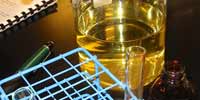Urine therapy can be beneficial only as placebo effect
Urine therapy, or urinotherapy, is a disputable method of treatment. However, it has been used to treat a variety of diseases since times immemorial. Urine therapy first appeared in Russia in the 1920s. Nevertheless, modern medicine still does not have a common approach to this phenomenon.

In Ancient India urine was widely used internally and externally for healing purposes. The tradition lived up to the end of the 20th century. Even contemporary Indian politicians use urine therapy at times and consider this method of treatment to be highly effective. The followers of urine therapy in Russia believe that the human urine can be the best of all remedies in many occurrences.
When urinotherapy appeared in Russia for the first time, it gained popularity in the country very quickly. It was particularly popular to use the urine of pregnant women to treat men’s impotence. The urine of pregnant women was thought to contain specific sex hormones beneficial to men’s sexual function. This is true, although urine receives women’s hormones during pregnancy, which obviously can in no way help men retrieve their erstwhile power in bed.
The popularity of urine therapy led to the opening of the State Urine Therapy Research Institute in Moscow during the 1930s. The institute was closed soon afterwards. The research showed that urine was unsuitable for medical treatment. However, the fashion for the ancient treatment returned to Russia in the beginning of the 1990s.
Books describing the benefits of urine therapy are still available in many Russian bookstores. All those books say that urine can be used to treat any malady. Urine can be used even for the treatment of such dangerous illnesses as TB, syphilis, cancer and AIDS. However, science does not know anyone who has been able to cure themselves with the help of their own infectious and poisonous urine.
The majority of medics believe that urine can harmful and even dangerous for a human being when used internally. Even healthy individuals who used their own urine often complain of chronic nausea, diarrhea and gastrointestinal ailments. Such patients are usually hospitalized with wrong diagnoses – dysentery, typhoid fever, cholera. As a rule, doctors do not find any infection with such people. Afterwards they find out that all symptoms vanish as soon as they stop drinking their own urine.
Urine therapy is especially dangerous to pregnant women. It can result in miscarriage or pathologies of the fetus.
Urine is virtually the product of blood processing. Kidneys process and filter about 1,500 liters of blood every day. The process produces primaryurine – 180 liters. Most commonly the excretion of urine serves for flushing waste molecules collected from the blood by the kidneys, and for the homeostasis of the body fluids.
Urination is the primary method for excreting toxins, chemicals and drugs from the body. These chemicals can be detected and analysed by urinalysis. Cellular metabolism results in a buildup of toxic nitrogen compounds, or nitrogenous waste. Since this waste is toxic, most animals have excretory systems (in humans this is known as the Urinary system, which consists of the Kidneys, Urinary bladder, Ureter, and Urethra) to rid themselves of this waste. The kidneys extract the nitrogenous wastes from the bloodstream, as well as excess water, sugars, and a variety of other chemicals.
Urine of a healthy individual contains urea, kreatine, uric acid, ammonia and other toxins, the accumulation of which is dangerous for life. Urine of sick people contains acetone, salts of heavy metals and even malignant bacteria.
Nevertheless, incidents of recovery from minor ailments with the help of urine allows to assume that urine therapy can be beneficial under certain conditions when it is used to produce the so-called placebo effect. If a person devoutly believes in urinotherapy, he or she may have chances for recovery.
Urine's main constituents are water and urea. However, it contains small quantities of many hormones and metabolites, including corticosteroids. Whilst urea has been claimed by some practitioners to have an anti-cancer effect, available scientific evidence does not support claims that urine or urea given in any form is helpful for cancer patients. In addition, the other chemicals in urine might have some effect if ingested. In 1997, Joseph Eldor, of the Theoretical Medicine Institute in Jerusalem, published a paper suggesting that because cancer cells release antigens which appear in the urine, oral autourotherapy could spur the intestinal lymphatic system to produce antibodies against these antigens.
There has been no research that has found drinking urine to be useful for any illness. Human urine is normally relatively free of bacteria, since the bladder itself is normally a sterile environment, and drinking small amounts of one's own urine is unlikely to be seriously harmful. However, the urethra does contain bacteria, and this is why many physicians ask for a urine sample mid-stream, in order to allow the first few seconds of urination to wash out the bacteria within the urethra. Urinating on jellyfish stings is a common folk remedy, but has no beneficial effect and may be counterproductive as it can activate nematocysts remaining at the site of the sting.
Subscribe to Pravda.Ru Telegram channel, Facebook, RSS!




